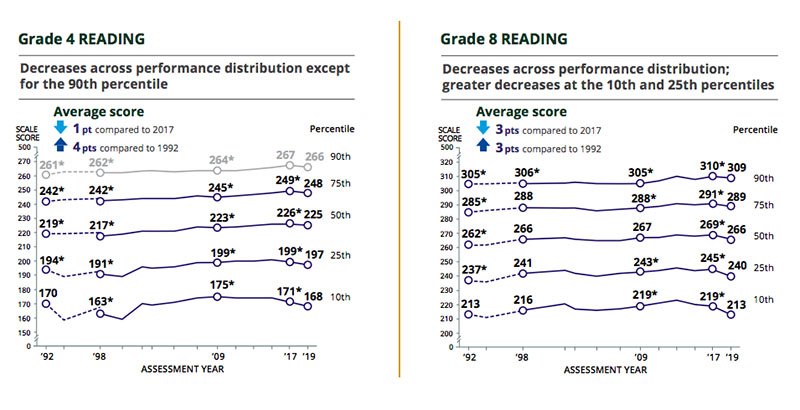Cowen & Forte: 5 Critical Steps to Take to Fix Our Students’ Flagging Literacy Skills and Falling NAEP Scores

The right to a good education and learning to read are fundamental to our democracy and to ensuring that our children can participate fully in civic life. Indeed, all children must become good readers if our country is going to overcome the racial and economic disparities that hold America back from fulfilling its ideals as a land of opportunity for all.
But our nation is falling short in its responsibility to ensure that students of all backgrounds have basic literacy skills.
We need look no further than the latest results from the National Assessment of Educational Progress (NAEP) for proof. Only 35 percent of fourth-graders and 34 percent of eighth-graders demonstrated proficient reading skills. The achievement gap between students who live in the top 10 percent of income and those who live in the bottom 10 percent has grown in the past decade. What’s more, while our nation’s highest-performing readers are improving, struggling readers continue to struggle. Gaps also persist in reading achievement for students of color, English learners and students with disabilities.
All this should serve as a wake-up call that our nation needs to do better for its children.
Solutions to this literacy crisis will require political courage, creativity and commitment on the part of educators, a deep belief that all children are capable of achievement and an understanding of the science on how youngsters learn to read.
Specifically, we urge policymakers and other education stakeholders — very much including our own organizations — to focus on five critical areas:
● Assist organizations and communities in their efforts to strengthen reading strategies.
● Increase the federal investment in local and state evidence-based comprehensive literacy efforts.
● Push for the use of high-quality, standards-aligned curriculum materials.
● Advance the capacity of teachers in teaching literacy improving teacher preparation programs.
● Embrace the science of reading.
Reading is a complex process. Fortunately, reading instruction is one of the most researched areas in education. As a field, we know how to teach virtually all children how to read.
We know it’s critical for children to be able to distinguish the individual sounds of English and map them onto letters. They must be able to decode and read words fluently. And they need the vocabulary and background knowledge to understand what they are reading. Each of these elements has an enormous research base that has been called, collectively, the science of reading.
However, this science has not reached educators as it should. It is long past time to ensure that all teachers and principals understand how children learn to read and what kind of instruction will ensure that all kids do, no matter their background.
Among other things, this means that teacher and principal preparation programs should be required to incorporate what is known about reading instruction in their curricula. Much has been made of Mississippi’s improvement in reading on NAEP. It is impossible to draw a direct link without more research, but Mississippi recently required its teacher preparation programs to include instruction in the science of reading.
States, districts, and schools also need to acknowledge that teachers and principals must have curricula and professional development aligned to the science of reading, and sufficient time to learn new things and incorporate them into classroom instruction.
The dismal results on NAEP have seismic impacts when we consider how literacy, writing fluency and comprehension skills influence students’ later success in college and careers. Whatever the reasons — critics have variously blamed education reforms, inadequate and inequitable funding, poverty, lingering effects from the Great Recession, even large amounts of time spent in front of computer screens — we must keep standards and expectations high so all students graduate with strong literacy skills.
It’s also important to look at what’s working: in addition to high-quality standards and assessments, Mississippi has focused on early literacy professional development for K-3 teachers, and the District of Columbia, which also posted NAEP gains, has emphasized continuous improvement among all its educators. Both have also invested in early childhood programs.
At the national level, the Council of Chief State School Officers will host a literacy summit next year, and our organizations recently joined 10 other education and civil rights advocacy groups to call for decisive steps to improve reading and literacy instruction.
It is up to local, state and federal policymakers to act decisively and without delay to improve reading instruction in America. We stand ready to support those efforts.
Jim Cowen is executive director of the Collaborative for Student Success. Denise Forte is the senior vice president for partnership and engagement at The Education Trust.
Get stories like these delivered straight to your inbox. Sign up for The 74 Newsletter

;)
